Palestinian solidarity activists throughout the US commemorated Israeli Apartheid Week in early March. While many organized marches and demonstrations, activists at Oberlin College, a small liberal arts school in Oberlin, Ohio, partook in the week of action a bit more creatively.
Oberlin Students for a Free Palestine (SFP) created a giant rock installation
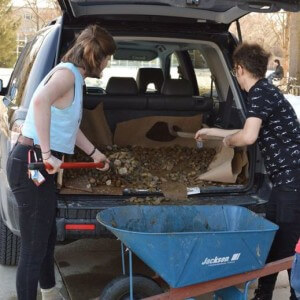
in their university’s library, in order to raise awareness about the imprisonment of Lina Khattab, a teenage Palestinian college student and dancer in the prominent El-Funoun Palestinian Popular Dance Troupe who was arrested in December 2014 on charges of “throwing stones” and “participating in an unlawful demonstration.”
SFP explained that the rocks “symbolize[d] the resistance embodied by Khattab and other Palestinians living under occupation.” Jacob Ertel, a student activist, told Mondoweiss that, first and foremost, the installation was meant to be pedagogical in nature, lamenting that “many students may unfortunately be oblivious to” the oppression Palestinians endure.
Beyond that, however, Ertel said that they “wanted to demonstrate, on a visceral level, the ridiculousness of what Khattab was actually sentenced for: throwing rocks. The pile of stones forces the viewer reckon with the power imbalance inherent in the occupation; there’s no way to normalize it.”
The students transported the rocks in the back of a car, shoveled them into a wheelbarrow, and wheeled them into the campus library. The exhibition was installed on 9 March, and remained up for a week. SFP prefaced the installation with a letter to the editor in their student newspaper, in which they draw attention to the plight of Palestinian political prisoners such as Khattab and Rasmea Odeh, speak about Israeli Apartheid Week, and call for divestment from corporations complicit in human rights violations.
A large sign accompanied the pile of stones, reading
This stone pile commemorates Lina Khattab, an 18-year-old Palestinian university student. Khattab was arrested on Dec. 13th by Israeli troops on the charges of throwing stones and “participating in an unlawful demonstration.” She and other students had been celebrating the 47th anniversary of the founding of the Popular Front for the Liberation of Palestine (PFLP) and demonstrating in support of Palestinian political prisoners. On Feb. 16th, Khattab was sentenced by an Israeli military court to 6 months in prison and 3 years on probation, and fined $1,500. She is currently incarcerated in HaSharon Prison in Israel. As we continue to remember March 4th, to recognize Israeli Apartheid Week, and to celebrate International Working Women’s Day, we honor the actions of Khattab and countless others who disrupt the vicious regime of occupation and who tirelessly fight for Palestinian liberation.
Mondoweiss also spoke with Victoria Velasco, a fellow SFP organizer. “It’s important for Palestine solidarity groups to draw attention to violence against Palestinian women such as Lina Khattab and Rasmea Odeh,” she said. “While general news regarding Palestinian resistance is systemically silenced in US mainstream media, that of women is particularly ignored even within Palestine solidarity circles.”
“On the campus of our elite liberal arts college, students are reluctant to engage with anything that reminds them of their own complicity in state violence—whether in the US or elsewhere,” Velasco continued. “The whitewashed celebration of the role of women in the perpetuation of imperialist projects—as seen in the glorification of female IDF soldiers on International Women’s Day—demonstrates a violent censure and denunciation of resistance carried out by women who are most vulnerable to state violence.”
“The goal of this installation is to call attention to the repression of Palestinian women’s resistance and to condemn the gendered punishment of women who struggle against the occupation,” she explained. “We honor Khattab’s contributions to the Palestinian fight for freedom and refuse to remain complicit in the unjust imprisonment, sexual abuse, and torture experienced by most Palestinian political prisoners.”
Inside the Israeli Prison System
The students also handed out pamphlets with further information about Khattab and Palestinian political prisoners. A digital copy is embedded below.
Khattab, like many detainees, has been tortured while in Israeli custody. She says she has endured “extreme beatings” by Israeli soldiers, and authorities have constantly subjected her to extreme cold temperatures and sleep deprivation. When her mother visited her, she noticed her daughter had lost a lot of weight.
That harsh conditions such as these are widespread in the Israeli prison system is well-documented. The UN Committee on the Rights of Children (CRC), in its 2013 review of Israel’s child rights record, expressed “its deepest concern about the reported practice of torture and ill-treatment of Palestinian children arrested, prosecuted and detained by the military and the police, and about the State party’s failure to end these practices in spite of repeated concerns expressed by treaty bodies.”
Adalah, the Legal Center for Arab Minority Rights in Israel, has detailed Israel’s systematic torture of detained Palestinian children. The organization indicates that interrogators have regularly “threatened children with beatings, isolation, torturing their fathers and raping their mothers and sisters; children were denied food for dozens of hours unless they confessed to the charges against them.”
The Palestinian Prisoners Club also found that 40% of Palestinian children arrested in Jerusalem had been sexually abused.
20 more Palestinian women and girls as young as 14 have been detained with Khattab in HaSharon prison.
Meanwhile, according to Israeli courts’ own data, 99.74% of cases in Israel’s military courts in the illegally occupied Palestinian territories end in a conviction. In late 2014, Israeli ministers passed legislation that calls for sentencing Palestinian youth who throw stones to up to 20 years in prison, even if the court could not prove that the stone-throwers intended to damage property or harm others.
Sahar Francis, Director of Addameer, the Prisoner Support and Human Rights Association, told The Electronic Intifada that he believes Israel is severely punishing Khattab and “using her case in order to frighten students from being involved in activism.”
Other Creative Actions
Oberlin SFP has a history of similarly creative actions. In September 2014, just weeks after students returned from summer break, the students marked the International Day of Action on College Campuses by creating an enormous “2,133 black flags, 2,133 Palestinians dead, do not be silent” installation, planting a small black flag for every Palestinian killed in Israel’s summer 2014 attack on Gaza, known as “Operation Protective Edge.”
Leading human rights organizations Amnesty International and Human Rights Watch accused Israel of committing war crimes in this 51-day assault, and an independent investigation conducted by leading medical and scientific experts found Israel deliberately targeted civilians with extremely violent tactics.
In front of the thousands of flags, students hung a banner reading “This is not a vigil. This is a call to action. It is a recognition of our complicity in these acts of violence. It is a refusal to be silent.” The activists also asked onlookers to sign their online petition, demanding an administrative response to an Oberlin student divestment resolution.
Then, as now, the students said they saw a mostly positive response from fellow students and from the local community.

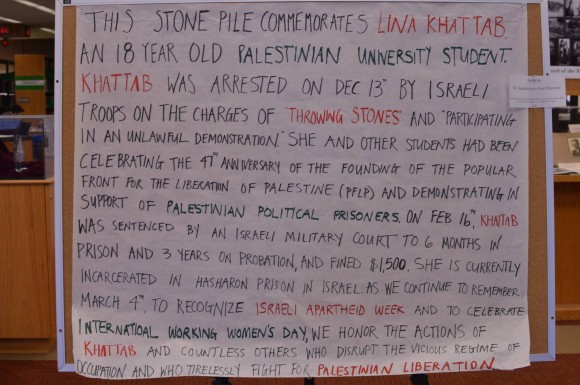
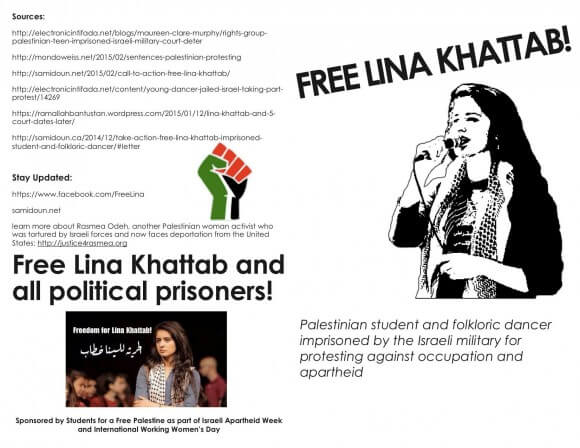
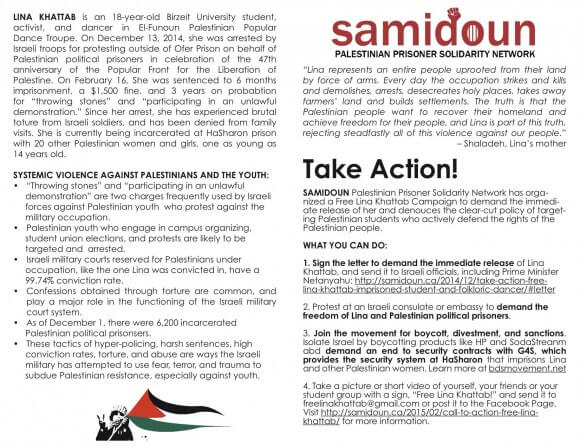
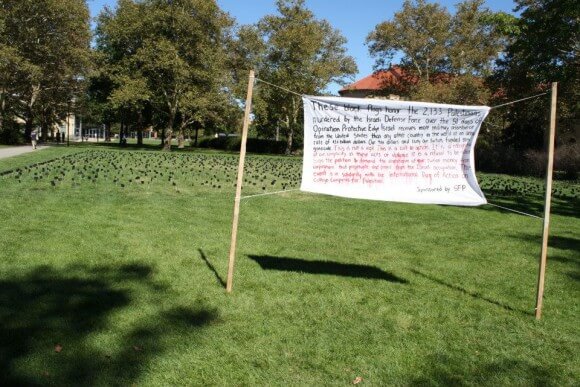


They should be more honest. They should throw the rocks at passersby and see whether they get arrested.
Thank you for this, Ben Norton, great story! I love Oberlin!
“Oberlin College, a small liberal arts school in Oberlin, Ohio”
It may be ‘small’, but these actions are the actions of a giant. It is a ‘liberal arts school’, and it is one marked by the best of humanity.
“first and foremost, the installation was meant to be pedagogical in nature, lamenting that “many students may unfortunately be oblivious to” the oppression Palestinians endure.”
A pedagogical endeavor trumps forceful proselytism nearly every time. Kudos. I hope that truthful, fact- based conversations emerge.
I am grateful that these students of SFP, and those receptive of their message, are part of my universe.
Thank you, Ben.
Some other displays that could be created (if they haven’t been already):
– A chart depicting the # of Israeli nuclear weapons vs. a chart depicting the # of Palestinian nuclear weapons
– A chart containing counts of Israeli warplanes, warships, drones and assorted military vehicles vs. a chart containing counts of Palestinian warplanes, warships, drones and assorted military vehicles
– A map showing the geographic region of Palestine stolen, occupied and colonized by Israel vs. a map showing the geographic region of Israel stolen, occupied and colonized by Palestine
– A pile of miniature coffins equalling the # of Palestinians killed by Israel vs. a pile of miniature coffins equalling the # of Israelis killed by Palestine
– A pile of walking sticks equalling the # of Palestinians ethnically cleansed from their homes and lands by Israel vs. a pile of walking sticks equalling the # of Israelis ethnically cleansed from their homes and lands by the Palestine
Ben, thanks for info and the pic.
Creativity is always a PLUS!
Good on them and good on Oberlin for allowing loose rocks in their library!